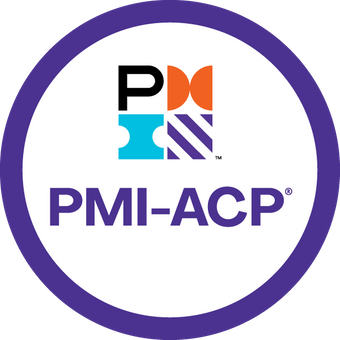The PMI Agile Certified Practitioner (PMI-ACP) course prepares students for the PMI Agile Certified Practitioner (PMI-ACP) certification as well as prepares them for a career as a PMI-ACP certified practitioner. On average a PMI-ACP certified practitioner makes $115,000 annually. During the program students will get a full understanding of what it takes to become a PMI-ACP certified practitioner learning both theory and project-based skills needed to earn the certification. The included courses cover everything needed to successfully pass the PMI Agile Certified Practitioner (PMI-ACP) certification exam.
What You will Learn
- You will learn about various Agile methodologies, such as Scrum, Kanban, Lean, and XP, and how they can be applied to manage and deliver projects in an Agile environment.
- You will learn how to use Agile tools and techniques to manage project risks, stakeholders, communications, and quality.
- You will learn about Agile leadership and collaboration skills, such as Servant Leadership, Facilitation, Coaching, and Mentoring.
Course Format
- On-Demand Lectures
- Instructor Support
- Academic Coaching
- Earn Contact Hours/PDUs
- Certification Preparation
Course Duration
- 3 to 6 Months
- Weekday & Weekend Live Zoom Mentoring
- 12 Month Access
Course Content
Scrum and Agile Immersion
Module 1- Introduction
Introduction discussed the course, the instructor and provides a course overview including course module outline.
Module 2- Agile Overview
Agile Overview introduces basic agile concepts including history, key concepts, frameworks, and the comparison of waterfall VS agile approaches. This module also reviews causes of project delays, the Agile manifesto for software development and the 12 principles behind that manifesto.
Module 3- Scrum Overview
Scrum Overview discusses Scrum in agile including the Scrum framework and its related ceremonies. This module introduces the Scrum phrase (Scrum = 3 Roles + 6 Events + 3 Artifacts) and the key benefits of Scrum.
Module 4- Roles and Responsibilities
Roles and Responsibilities focuses on the various roles that are part of an Agile project, the responsibilities of each role, and then how those roles interact. This module introduces the Scrum team, scrum master, servant leader, product owner, development teams and discusses how the scrum team interacts.
Module 5 - Project Lifecycle
Project Lifecycle is a lengthy module that take a detailed look into the Scrum project lifecycle and key project concepts. Module 5 is split over two weeks and includes project basics and scrum-specific items like sprints, backlogs, user stories, story points, and personas. Addition topics include acceptance criteria, planning. User
cards, the 3 C’s of the User Story (Card, Conversation, Confirmation), and product backlog refinement and design.
Module 6- Building High Performing Teams
Building High Performing Teams discusses the most important aspect of Scrum projects- the team itself.
This module defines a high performing team, details benefits of high performing team and tips on how to build a high performing team. Module 6 also includes stages of team development, working agreements, using ans
resolving conflict, team events, and effective meeting strategies. This module additionally describes the scrum master as a servant leader, as a coach, and strategies
for being a better coach.
Module 7- Scaling Agile
Scaling Agile explores how to take Agile principles, processes, and techniques and how these items can be scaled. This module introduces the SAfe framework including vision, roadmaps, decomposing (project and program), cadence and synchronization, Aha!, and the scaling matrix. This topic also discusses applying
agile to portfolios, organizations, and Full SAFe.
Module 8- Closure
Closure wraps up the course including “10 Signs You are Not Really Doing Scrum, ” and additional tips for becoming a great scrum master. This module also discusses limiting work in progress, defining done, communication strategies, and applying relentless improvement to projects and continuous learning.
Course Content
PMI Agile Certified Practitioner (PMI-ACP) Exam Prep
Chapter 0- Introduction
Introduction covers Course Objectives, an introduction to the Project Management Institution, and explains the ACP Exam including first steps for starting up for the exam, terms that you’ll need to know for the course, what’s needed to get the ACP, recommended application steps and what’s needed to keep the certification. This chapter also reviews expectations for the exam, what its like to take the exam (onsite or online).
Chapter 1- Project Management Fundamentals
Project Management Fundamentals discusses project management fundamentals, defines a project and describes the difference between factories and operations versus projects. This chapter defines project and program management and reviews more on the PMI ACP Exam.
Chapter 2- Agile Fundamentals
Agile Fundamentals introduces agile, the agile manifesto, and agile principles including types of agile, Scrum, Scrumban, Kanban, scaled agile (SAFe), and implementing disciplined agile delivery.
Chapter 3- Domain I: Agile Principles and Mindset
Agile Principles and Mindset discusses strategies to advocate for agile principles within organizations, creating common understanding of agile values, establishing organizational effectiveness and efficiencies and using visualization and information radiators. This chapter also reviews pursuit of continuous improvement, experimenting with new techniques and process ideas, team collaboration, fostering self-organization and empowerment and the concept of servant leadership.
Chapter 4- Domain II: Value-Driven Delivery f
Domain II: Value-Driven Delivery focuses on incremental production, justin-time delivery, defining team processes, identifying and responding to risk in agile projects, and the importance of regular retrospectives. This chapter also discusses prioritizing units of work, quality techniques, and various environmental, operational, and infrastructure factors. Chapter 4 closes with looking at operational reviews and
checkpoints, the total value proposition, reprioritizing to maximize value, nonfunctional requirements, and strategies for overall improvements in the process, product, and/or service.
Chapter 5- Domain III: Stakeholder Engagement
Domain III: Stakeholder Engagement discusses stakeholder interests, needs, and expectations, knowledge sharing (definition, key components, and best practices), stakeholder working agreements, and change management for the stakeholder. This chapter includes group decision-making and conflict resolution, highlevel vision and objectives as it pertains to stakeholders, aligning expectations for the
team, communicating with your stakeholder, and forecasting for your agile projects.
Chapter 6- Domain IV: Team Performance
Team Performance introduces team coherence including team development, building high-performance cross-functional teams, team selforganization and strategies for team morale in the agile world. This chapter includes team co-location and communication, distractions, team vision, and wrapping up with
team performance measurements using burndown and iteration status charts.
Chapter 7- Domain V: Adaptive Planning
Domain V: Adaptive Planning looks at rolling wave planning and progressive elaboration, publishing planning results, communicating deliverables (to teams and leadership) and adapting cadence. This chapter includes concepts of inspect and adapt, adjusting for variables, and adjusting projects for maintenance and
operational demands. Chapter 7 also reviews estimating (scope, schedule, and cost
Range), refining delivery, using data for calibration.
Chapter 8- Domain VI: Problem Detection and Resolution
Problem Detection and Resolution focuses on fostering the right environment for your team. This chapter includes views around conflict resolution and the improvement process, risk resolution for risks in the project
process, and risk management to avoid and mitigate risks. Chapter 8 also explores the
most effective processes for communicating risks in projects.
Chapter 9- Domain VII: Continuous Improvement
Continuous Improvement looks at continuous improvement through periodic reviews of team effectiveness, frequent organization retrospectives, using demonstrations, and encouraging learning. This chapter introduces value stream analysis and creating/ maintaining systemic improvements.
Career & Certification

PMI Agile Certified Practitioner (PMI-ACP)
The PMI Agile Certified Practitioner (PMI-ACP) certification is designed to acknowledge an individual’s understanding of agile principles and proficiency in agile techniques. It demonstrates to colleagues, employers, and stakeholders that the certified individual possesses comprehensive knowledge of agile methodologies. The PMI-ACP certification was developed by professionals with extensive experience in agile practices, specifically for those working in agile environments.
- Agile Project Manager
- Scrum Master
- Agile Coach
- Agile Business Analyst
- Product Owner
- Iteration Manager
- Agile Consultant
- Project Management Office (PMO) Manager
The Bureau of Labor Statistics (BLS) job outlook for Project Managers varies by industry and specific role. Overall, the employment of project managers is projected to grow faster than the average for all occupations, with an expected job growth rate of 8 percent from 2020 to 2030. The demand for project managers is driven by the need for organizations to complete projects on time, within budget, and with high quality.
According to BLS data, the median annual wage for project managers was $76,240 in May 2020, with the highest 10 percent earning more than $138,230. However, the actual salary for a project manager can vary significantly depending on factors such as industry, experience, location, and specific job responsibilities.
What to Expect from a Career Academy Course
On-Demand Lectures
Online On-Demand lectures by top instructors who are industry subject matter experts. Learn from your computer, tablet as well as mobile devices.
Academic Coaching
You will be assigned an academic coach to guide you through the coursework when you enroll. Your academic coach is available via Zoom live, Text and Emails during both weekdays and weekends.
Instructor Support
Meeting with our instructors and subject matter experts one on one during both weekdays and weekends via flex schedules of live Zoom mentoring sessions.
Total Flexibility
Flexible online coaching and live mentoring combined with on-demand training gives you ultimate control of your learning experience.
Simulation Software
Our simulation software is used by students to develop practical skills and knowledge relative to program they are taking.
Certification Preparation
Our award-winning test prep engine provides you with the most relevant test questions to fully prepare you for the cert exam
Total Flexibility
Flexible online coaching and live mentoring combined with on-demand training gives you ultimate control of your learning experience.
Hands-on Labs
Reinforce your knowledge by accessing REAL equipment online with no restrictions and full administrator privileges, live in real time.
Certification Preparation
Our award-winning test prep engine provides you with the most relevant test questions to fully prepare you for the cert exam
Total Flexibility
Flexible online coaching and live mentoring combined with on-demand training gives you ultimate control of your learning experience.
Earn Contact Hours/PDUs
With our Programs and Courses you have the ability to earn Contact Hours or PDU’s that are applicable to your industry.
Certification Preparation
Our award-winning test prep engine provides you with the most relevant test questions to fully prepare you for the cert exam
Total Flexibility
Flexible online coaching and live mentoring combined with on-demand training gives you ultimate control of your learning experience.
12 Month Access
You will have up to 12 month access to your course to help you further prepare for your certification after completion.
Certification Preparation
Our award-winning test prep engine provides you with the most relevant test questions to fully prepare you for the cert exam

Accelerate Your Career With Online Managed Learning
From the moment you reach out to Career Academy, our education consultants will work with you to find scholarship opportunities and the best funding options available.
- Dedicated Student Success Coaches
- One on One Instructor Mentoring via Zoom Weekdays and Weekends
- Study Groups & Networking via Zoom




